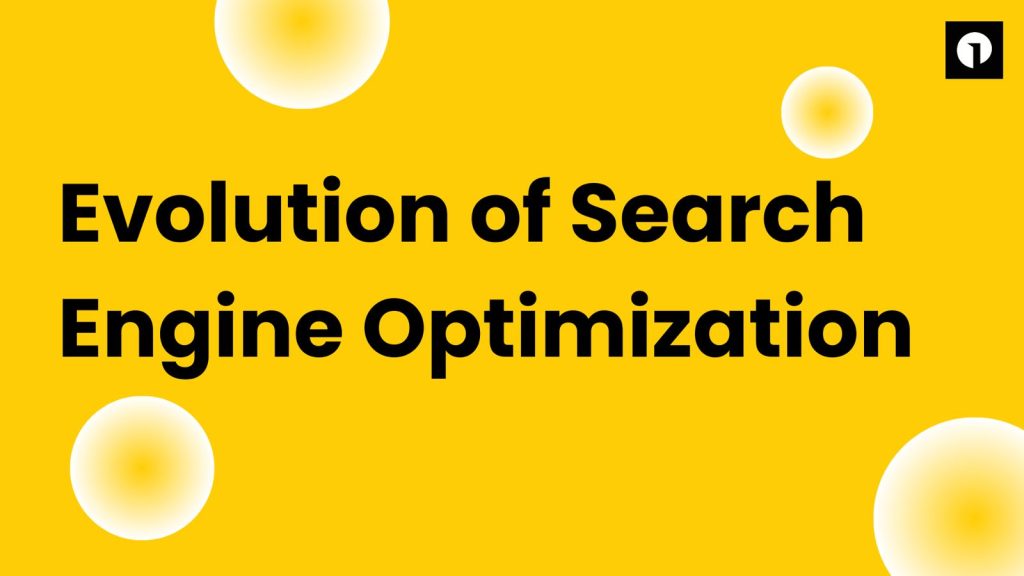In today’s digital world, Search Engine Optimization or SEO revolves around Google. Over the 25 years, SEO has undergone a lot of significant changes but its importance has remained the same. From basic keyword matching functions in the 90s to aligning with the most complex ranking system generated by AI(Artificial Intelligence), SEO has evolved a long way. Due to this evolution, every individual has a separate definition of SEO in their minds. SEO has been and still is changing so rapidly that it becomes a daunting task to even keep track of the changes. SEO is no longer a simple systematic function of injecting content with keywords or a sprinkle of meta tags. SEO has become a hub of strategies, practices, and ever-evolving trends that can leave even the most seasoned SEO experts in shock.
Now let’s have a look into the history of SEO from the 1990s to this current date and how it has evolved over the years.
THE EARLY DAYS
The evolution of SEO dates back to the 1990s and this era is also called “the Wild West of the Internet”. After the launch of the world’s first website by Tim Berners-Lee, in 1994 search engines like Yahoo!, AltaVista, Excite, etc were launched. In 1996, two Stanford University students built a search engine called Backrub that ranks links based on their relevancy, popularity, and trustworthiness. And that Backrub eventually became Google which is currently the most essential part of our daily life.
In the early days, website owners used to think that the page would rank on top by using or repeating as many keywords as possible. They used popular search terms in their meta tags regardless of their relevance, leading to a lower caliber of search results. This was called the era of “keyword stuffing”. SEO’s “wild west” period didn’t last very long as search engines soon evolved to penalize over-optimization and reward pages with relatable and genuine content.
EARLY 2000s; THE ERA OF GOOGLE
Leaving the unethical optimizing tactics era, in the early 2000s SEO faced a dramatic shift in ranking sectors. Yahoo! was the household name at that time and people barely knew about Google. With the most mind-blowing strategy, Google partnered with Yahoo! and Yahoo!’s organic search was maintained by Google. As a result ‘Powered by Google’ was visible in every search.
Google gained its ever-lasting popularity. Google cured both on-page and off-page factors. Google’s very own tools like web crawler and PageRank became revolutionary for data retrieval all because of its algorithms. Website owners upon understanding the values of high-quality and engaging content can only create a higher rank for their website, search engine technology matured from “keyword stuffing”. Legitimate optimization strategies like semantic keyword research became more crucial to follow. Google truly revolutionized SEO from a competition of keyword playing to an extraordinary process of creating quality content.
THE ERA OF IMPROVISING
The late 2000s is significantly known as a new era in SEO where content becomes the king. In this era of SEO revolution, Google has created many new features, elements, tools, and algorithms to make this whole experience easier for consumers. Instead of manipulation of keywords, high-quality creative content like long-form educational articles and storytelling became one of the popular ways to earn rankings and generate user’s trust. Around 2006, Google acquired YouTube and launched major tools like Google Analytics and Webmaster.
THE PRESENT
After 2010, it now lands in the present era where SEO and Google search algorithms undergoes many crucial updates. In 2011, Google launched Schema, Panda, Hummingbird, and several other updates that created a new flow of technological revolution. From 2015 onwards the rise of smartphone and mobile searches took over desktop searches in a vast majority. And that pushed website owners to ensure that their consumers had a seamless mobile-friendly experience. With that Mobile-Friendly algorithms were being updated in every search engine. In present days, SEO techniques don’t only depend on on-page techniques but rather on the speed & experience of the site and the quality of content.Mobile and voice search content are emerging in the present. The quality of content matters more than the quantity. This decade has shown search engines often develop in unexpected and usual ways and as long as people explore the online world for answers, SEO will retain its human core. understanding needs, building connections, and empowering journeys of learning.








